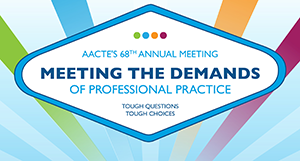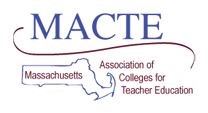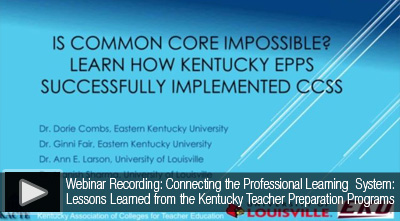01 Apr2016
By Aaron Goldstein
Ed Prep Matters is pleased to bring you this special feature on policy and AACTE chapter activity in the states. For a summary of February’s state activity, see this article; January’s state activity is available here.
Overview of State Policy Activity
In March, at least 30 state legislatures met as part of their 2016 legislative sessions. At least 184 state bills were introduced related to educator preparation. Since the New Year, approximately 300 bills have been introduced, of which seven have been signed into law.
01 Mar2016
By Aaron Goldstein
Ed Prep Matters is pleased to bring you this special feature on policy and AACTE chapter activity in the states. For a summary of January’s state activity, see this article, or to see a year-end recap for 2015, see this article.
 Overview of State Policy Activity
Overview of State Policy Activity
In February, 40 state legislatures convened for their 2016 legislative sessions. At least 160 bills were introduced in 30 states that could have an impact on educator preparation programs.
01 Mar2016
By Kristin McCabe
During their meeting February 22, members of AACTE’s Board of Directors chose officers for the coming year to serve with new Board Chair Jane Bray (see press release).
Effective today through next February, the Executive Committee includes the following leaders:
09 Feb2016
By Nadene Davidson
 As chair-elect of AACTE’s Advisory Council of State Representatives (ACSR), I invite you to join me in an engaging, thought-provoking, and solutions-oriented panel discussion about school-staffing challenges during AACTE’s Annual Meeting in Las Vegas.
As chair-elect of AACTE’s Advisory Council of State Representatives (ACSR), I invite you to join me in an engaging, thought-provoking, and solutions-oriented panel discussion about school-staffing challenges during AACTE’s Annual Meeting in Las Vegas.
On Tuesday, February 23, at 1:45 p.m., ACSR will host the major forum “A Regional Lens to Addressing Teacher Shortage and Distribution by Subject and Location,” focusing on factors contributing to the western region’s teacher shortages and to the inequitable distribution of effective educators. (You can add the session to your personal schedule in the Online Event Planner).
02 Feb2016
By Aaron Goldstein
 Over the past month, 35 state legislatures have convened for their 2016 legislative session—and it’s already been a productive year. Since January 1, nearly as many state bills related to educator preparation have been introduced as in all of 2015. In 2015, about 150 such bills were introduced; during January 2016, there were 133, introduced in 33 state legislatures. The states with the most bills proposed so far are New Jersey, Oklahoma, Iowa, Florida, and Michigan. Some of the common topics addressed in the bills include modifying teacher certification/licensure standards as related to teacher shortages and alternative routes to certification, investing in scholarships and loan forgiveness for teachers, and mandating training for teachers to support students with dyslexia as a requirement for licensure.
Over the past month, 35 state legislatures have convened for their 2016 legislative session—and it’s already been a productive year. Since January 1, nearly as many state bills related to educator preparation have been introduced as in all of 2015. In 2015, about 150 such bills were introduced; during January 2016, there were 133, introduced in 33 state legislatures. The states with the most bills proposed so far are New Jersey, Oklahoma, Iowa, Florida, and Michigan. Some of the common topics addressed in the bills include modifying teacher certification/licensure standards as related to teacher shortages and alternative routes to certification, investing in scholarships and loan forgiveness for teachers, and mandating training for teachers to support students with dyslexia as a requirement for licensure.
In addition, since the New Year, 34 state regulations have been proposed in 17 states related to educator preparation. The vast majority of the proposed state regulations relate to streamlining or clarifying teacher certification standards.
26 Jan2016
By Sungti Hsu
As the Every Student Succeeds Act rolls back the direct federal involvement in improving student achievement and hands over much of that authority to states, lawmakers throughout the country will be examining a range of issues related to PK-12 education during their 2016 legislative sessions. One of the most pressing concerns on many states’ lists is teacher shortages.
At AACTE’s 2016 Annual Meeting next month in Las Vegas, a three-part series of panel discussions on the topic has been organized with the help of the Advisory Council of State Representatives:
12 Jan2016
By Carlette Jackson Hardin

On December 2, 2015, the members of the Tennessee Association of Colleges for Teacher Education (TACTE) held their collective breath as the Tennessee State Board of Education released the 2015 Report Card on the Effectiveness of Teacher Training Programs. After 5 years of publicity nightmares as programs’ ratings and rankings received widespread media attention, would this year’s report be any better?
Back in 2007, the Tennessee General Assembly passed legislation requiring the publication of a report on the effectiveness of educator preparation programs (EPPs) throughout the state. The report was to provide the following information on program graduates: placement and retention rates, Praxis II scores, and teacher effect data based on the Tennessee Value-Added Assessment System (TVAAS). Meghan Curran, director of Tennessee’s First to the Top programs, noted, “It is our intent that the report cards will help institutions identify both what they do well and where there is room for growth based on the outputs of their graduates.”
22 Dec2015
By Deborah Landry
Over 940 emergency credentials have been issued this year by the Oklahoma State Department of Education (OSDE) as a result of the statewide teacher shortage. A preliminary report issued December 10 by a state task force offers recommendations that aim to tackle the problem on multiple fronts.
The task force, formed by the OSDE to identify and recommend strategies for reducing the shortage, includes more than 60 legislators, OSDE staff, educators, business leaders, teacher organizations, education advocacy groups, and other community-based stakeholders. I represent teacher preparation programs on the task force, particularly through my role as president of the Oklahoma Association of Colleges for Teacher Education (OACTE), a state affiliate of AACTE.
15 Dec2015
By Kathleen McNamara

Political advocacy was the focus of much work this fall for the Massachusetts Association of Colleges for Teacher Education (MACTE). The national attention to teacher preparation policy, from the reauthorization of the Elementary and Secondary Education Act to the proposed teacher preparation program regulations, inspired our state chapter to respond in a big way. We were—and are—determined to tell our story.
As a first step, the MACTE Executive Board created a “take home document” to educate our elected officials, highlighting some of the current work of member institutions. We pointed out initiatives and programs that were specifically developed to meet the greatest needs of our PK-12 partners and, ultimately, the needs of the students in the commonwealth. To compile this document, we put a call out to all of our member institutions to tell us what they were doing across five main focus areas:
14 Dec2015
By Aaron Goldstein and Sungti Hsu
As 2015 comes to an end, we want to take a moment to reflect on what was a very active year for state policy makers and AACTE state chapters.
In 2015, state legislators proposed more than 150 bills related to educator preparation. Of these proposed bills, 18 were enacted into law. Some of the highlights of these new state laws are the creation of a new teacher leader endorsement in New Jersey; establishing the Teach Nevada Scholarship Program to incentivize students to pursue teaching degrees in Nevada; prohibiting video recording of classroom teachers in New Hampshire; and modifying teacher licensure standards in Delaware, Illinois, Maine, and Michigan.
17 Nov2015
By Lori V. Quigley

On October 14-16, the New York Association of Colleges for Teacher Education (NYACTE) partnered with the New York State Association of Teacher Educators (NYSATE) to host a joint fall conference in Saratoga Springs, NY. The conference theme, Developing a Critical Consciousness to Affect Change in Teacher Education, captured the exemplary work of our colleagues who concentrate their energies on shaping policy in educator preparation, nurturing and sustaining PK-12 partnerships, adapting to changes in accreditation, and focusing on best practices.
05 Nov2015
By Sharon Robinson

As the Common Core State Standards (CCSS) and their kindred iterations continue to gain traction in schools around the country, staff development efforts have been bringing in-service educators up to speed, and colleges of education have been adjusting their curricula to ensure that the field’s newest professionals are also ready for the new standards. Nowhere has this shift seen greater success than in Kentucky, which was the first state to adopt and implement CCSS. A recent AACTE webinar sponsored by the Learning First Alliance’s “Get It Right” campaign highlighted the remarkable progress made by institutions in the state.
20 Oct2015
By Arlinda J. Eaton
Meaningful and purposeful collaboration among multiple agency heads is something that many states aspire to do. Georgia is among those that have been successful in forming such alliances, which provides a supportive environment for the work of the Georgia Association of Colleges for Teacher Education (GACTE).
The collaborative culture is well established in the Georgia Alliance of Education Agency Heads, which over the past decade has been successfully fulfilling its mission to collaborate, innovate, and achieve while addressing three strategic goals: (1) increase the percentage of students reading at grade level by completion of third grade; (2) increase the percentage of graduates from high school and postsecondary institutions prepared for the demands of college, workplace, a global economy, and responsible citizenship; and (3) increase the percentage of effective teachers and educational leaders. The alliance includes the state’s universities and technical colleges, the governor’s office, the Georgia Professional Standards Commission, and other education agencies.
13 Oct2015
By Jerrica Thurman
 Many educator preparation providers are highly engaged in the implementation of the Common Core State Standards (CCSS) and are actively working alongside PK-12 administrators, teachers, and parents to prepare students. Learn how AACTE member institutions in Kentucky are successfully implementing the standards in a free AACTE webinar, “Is Common Core Impossible?” Tuesday, October 20, at 2:00 p.m. EDT.
Many educator preparation providers are highly engaged in the implementation of the Common Core State Standards (CCSS) and are actively working alongside PK-12 administrators, teachers, and parents to prepare students. Learn how AACTE member institutions in Kentucky are successfully implementing the standards in a free AACTE webinar, “Is Common Core Impossible?” Tuesday, October 20, at 2:00 p.m. EDT.
Thanks to a grant from the Learning First Alliance’s Get It Right campaign, AACTE will host this webinar as the first in a two-part series on CCSS implementation in educator preparation programs. This webinar focuses on the successful work of the Kentucky Association of Colleges for Teacher Education in facilitating its members’ work to align their educator preparation programs with CCSS after Kentucky became the first state to adopt the standards. Presenters will discuss how a communication strategy, community involvement, policy advancement and alignment, and professional development and capacity building were used for successful implementation.
23 Sep2015
By Sungti Hsu

As your state chapters plan fall and spring conferences, executive retreats, and other meetings, please keep in mind that AACTE staff are available to serve as speakers and presenters at meetings around the country.







 As chair-elect of AACTE’s Advisory Council of State Representatives (ACSR), I invite you to join me in an engaging, thought-provoking, and solutions-oriented panel discussion about school-staffing challenges during AACTE’s Annual Meeting in Las Vegas.
As chair-elect of AACTE’s Advisory Council of State Representatives (ACSR), I invite you to join me in an engaging, thought-provoking, and solutions-oriented panel discussion about school-staffing challenges during AACTE’s Annual Meeting in Las Vegas.



 Many educator preparation providers are highly engaged in the implementation of the Common Core State Standards (CCSS) and are actively working alongside PK-12 administrators, teachers, and parents to prepare students. Learn how AACTE member institutions in Kentucky are successfully implementing the standards in a free AACTE webinar, “
Many educator preparation providers are highly engaged in the implementation of the Common Core State Standards (CCSS) and are actively working alongside PK-12 administrators, teachers, and parents to prepare students. Learn how AACTE member institutions in Kentucky are successfully implementing the standards in a free AACTE webinar, “